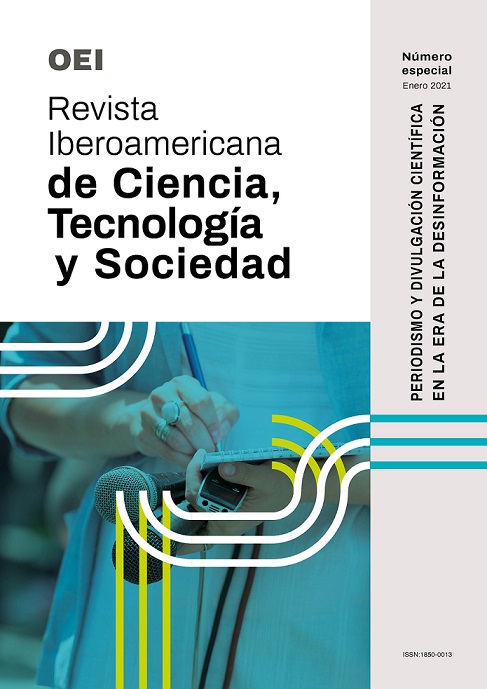Fake News, Media Approach and Disinformation about CONICET during the Conflict of December 2016
Keywords:
fake news, post-truth, CONICET, scientific legitimacy, discourse, pressAbstract
“Fake news” seems to be an ubiquitous term in the current debate regarding the state of journalism and the flow of information. However, its conceptual formulation is recent and there is still a broad spectrum to delve into more precise definitions. Our interest lies in fake news aimed at discrediting scientific institutions, which has clear political implications that condition the actions of the scientific field above and beyond its alleged autonomy. In Argentina, a phenomenon of this kind took place in December 2016, when, in response to researchers’ protests against budget cuts and austerity policies implemented by the national government, alternative information websites attacked CONICET staff by questioning some of their research topics in the social sciences. The debate spread throughout social media and was picked up by some of the most relevant newspapers in the country. Therefore, the aim of this paper is to suggest a typology of fake news, focusing on those related to science and its institutions, and analyze the deployment of fake news against CONICET in the press.Downloads
References
ANGENOT, M. (2010): Interdiscursividades. De hegemonías y disidencias, Córdoba, Universidad Nacional de Córdoba.
BASSETS, M. (2019): “Entrevista | Bruno Latour: ‘El sentimiento de perder el mundo, ahora, es colectivo’”, El País, 31 de marzo. Disponible en: https://elpais.com/elpais/2019/03/29/ideas/1553888812_652680.html.
BLOMMAERT, J. (2020): “Political discourse in post-digital societies”, Trabalhos em Linguística Aplicada, vol. 59, n° 1, pp. 390-403. Disponible em: http://dx.doi.org/10.1590/01031813684701620200408.
CASTELFRANCHI, Y. (2019): “Notícias Falsas na Ciência”, Ciência Hoje, 14 de enero. Disponible en: cienciahoje.org.br/artigo/noticias-falsas-na-ciencia/.
CASTELFRANCHI, Y. y FAZIO, M. E. (2020): “Comunicación de la ciencia en América Latina: construir derechos, catalizar ciudadanía”, El estado de la ciencia. Principales Indicadores de Ciencia y Tecnología Iberoamericanos / Interamericanos 2020, RICYT, pp. 145-156. Disponible en: http://www.ricyt.org/2020/11/ya-se-encuentra-disponible-el-estado-de-la-ciencia-2020/.
CALVO, E. y ARUGUETE, N. (2020): Fake news, trolls y otros encantos. Cómo funcionan (para bien y para mal) las redes sociales, Buenos Aires, Siglo XXI.
CÉSPEDES, L. y CHIAVASSA FERREYRA, A. (2020): “La comunicación pública de la ciencia y tecnología como acción política en un escenario de crisis”, ArtefaCToS, vol. 9, nº 2, pp. 27-49. DOI https://doi.org/10.14201/art2020922749.
CHARAUDEAU, P. (2012): “Los géneros una perspectiva socio-comunicativa”, en M. Shiro, P. Charaudeau, y L. Granato (eds.): Los géneros discursivos desde múltiples perspectivas: teorías y análisis, Madrid, Iberoamericana/Vervuert, pp. 19-45.
ECO, H. (1993): Lector in fabula, Barcelona, Lumen.
MCINTYRE, L. (2018): Posverdad, Madrid, Cátedra.
MUROLO, L. (2019): “La posverdad es mentira. Un aporte conceptual sobre fake news y periodismo”, en R. Aparici y D. García Marín (coords.): La posverdad. Una cartografía de los medios, las redes y la política, Barcelona, Gedisa, pp.52-64.
KALPOKAS, I. (2019): A Political Theory of Post-Truth, Cham, Springer International Publishing. DOI: https://doi.org/10.1007/978-3-319-97713-3.
OXFORD UNIVERSITY PRESS (2016): Oxford Word of the Year 2016 | Oxford Languages. Disponible en: https://languages.oup.com/word-of-the-year/2016/ Consultado el 21 de marzo de 2020.
POLINO, C., y CASTELFRANCHI, Y. (2019): “Percepción pública de la ciencia en Iberoamérica. Evidencias y desafíos de la agenda de corto plazo”, Revista Iberoamericana de Ciencia, Tecnología y Sociedad —CTS, vol. 14, n° 42, pp. 115–136.
ROQUEPLO, P. (1983): El reparto del saber. Ciencia, cultura, divulgación, Buenos Aires, Gedisa.
TANDOC, E. C., LIM, Z. W., y LING, R. (2018): “Defining ‘Fake News’: A typology of scholarly definitions”, Digital Journalism, vol. 6, n° 2, pp. 137–153. DOI: https://doi.org/10.1080/21670811.2017.1360143.
TRENDINALIA ARGENTINA (2016): Trending topics del miércoles 21 de diciembre en Argentina. Disponible en: https://www.trendinalia.com/twitter-trending-topics/argentina/argentina-161221.html.
VERÓN, E. (1993): La semiosis social, Barcelona, Gedisa.
Downloads
Published
How to Cite
Issue
Section
License
All CTS's issues and academic articles are under a CC-BY license.
Since 2007, CTS has provided open and free access to all its contents, including the complete archive of its quarterly edition and the different products presented in its electronic platform. This decision is based on the belief that offering free access to published materials helps to build a greater and better exchange of knowledge.
In turn, for the quarterly edition, CTS allows institutional and thematic repositories, as well as personal web pages, to self-archive articles in their post-print or editorial version, immediately after the publication of the final version of each issue and under the condition that a link to the original source will be incorporated into the self-archive.











